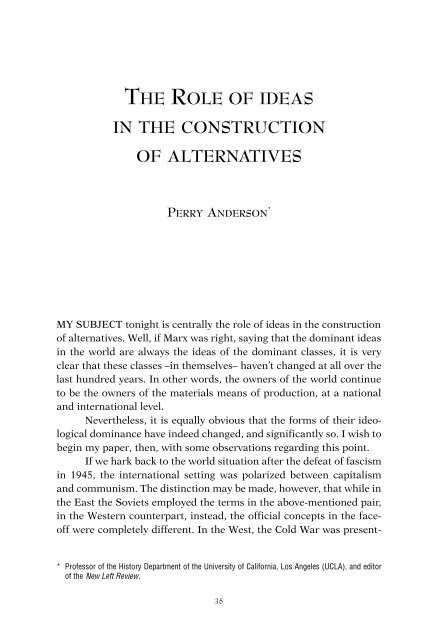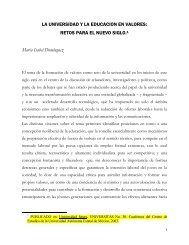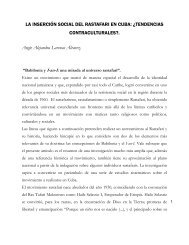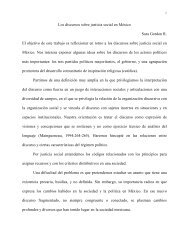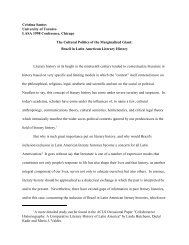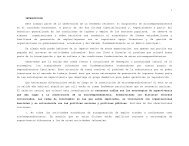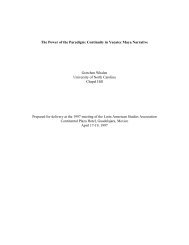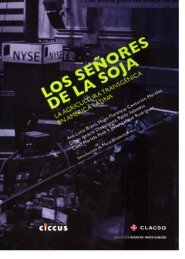the role of ideas in the construction of alternatives - Clacso
the role of ideas in the construction of alternatives - Clacso
the role of ideas in the construction of alternatives - Clacso
Create successful ePaper yourself
Turn your PDF publications into a flip-book with our unique Google optimized e-Paper software.
THE ROLE OF IDEASIN THE CONSTRUCTIONOF ALTERNATIVESPERRY ANDERSON *MY SUBJECT tonight is centrally <strong>the</strong> <strong>role</strong> <strong>of</strong> <strong>ideas</strong> <strong>in</strong> <strong>the</strong> <strong>construction</strong><strong>of</strong> <strong>alternatives</strong>. Well, if Marx was right, say<strong>in</strong>g that <strong>the</strong> dom<strong>in</strong>ant <strong>ideas</strong><strong>in</strong> <strong>the</strong> world are always <strong>the</strong> <strong>ideas</strong> <strong>of</strong> <strong>the</strong> dom<strong>in</strong>ant classes, it is veryclear that <strong>the</strong>se classes –<strong>in</strong> <strong>the</strong>mselves– haven’t changed at all over <strong>the</strong>last hundred years. In o<strong>the</strong>r words, <strong>the</strong> owners <strong>of</strong> <strong>the</strong> world cont<strong>in</strong>ueto be <strong>the</strong> owners <strong>of</strong> <strong>the</strong> materials means <strong>of</strong> production, at a nationaland <strong>in</strong>ternational level.Never<strong>the</strong>less, it is equally obvious that <strong>the</strong> forms <strong>of</strong> <strong>the</strong>ir ideologicaldom<strong>in</strong>ance have <strong>in</strong>deed changed, and significantly so. I wish tobeg<strong>in</strong> my paper, <strong>the</strong>n, with some observations regard<strong>in</strong>g this po<strong>in</strong>t.If we hark back to <strong>the</strong> world situation after <strong>the</strong> defeat <strong>of</strong> fascism<strong>in</strong> 1945, <strong>the</strong> <strong>in</strong>ternational sett<strong>in</strong>g was polarized between capitalismand communism. The dist<strong>in</strong>ction may be made, however, that while <strong>in</strong><strong>the</strong> East <strong>the</strong> Soviets employed <strong>the</strong> terms <strong>in</strong> <strong>the</strong> above-mentioned pair,<strong>in</strong> <strong>the</strong> Western counterpart, <strong>in</strong>stead, <strong>the</strong> <strong>of</strong>ficial concepts <strong>in</strong> <strong>the</strong> face<strong>of</strong>fwere completely different. In <strong>the</strong> West, <strong>the</strong> Cold War was present-* Pr<strong>of</strong>essor <strong>of</strong> <strong>the</strong> History Department <strong>of</strong> <strong>the</strong> University <strong>of</strong> California, Los Angeles (UCLA), and editor<strong>of</strong> <strong>the</strong> New Left Review.35
NEW WORLDWIDE HEGEMONY. ALTERNATIVES FOR CHANGE ANDSOCIAL MOVEMENTSed as a battle between democracy and totalitarianism. The Westernbloc did not employ <strong>the</strong> term “capitalism” for self-reference, s<strong>in</strong>ce thiswas considered basically as a term <strong>of</strong> <strong>the</strong> enemy’s, a weapon aga<strong>in</strong>st<strong>the</strong> system ra<strong>the</strong>r than a description <strong>of</strong> it. The West expressed itself <strong>in</strong><strong>the</strong> name <strong>of</strong> <strong>the</strong> “Free World,” not <strong>of</strong> <strong>the</strong> “Capitalist World.”In this sense, <strong>the</strong> end <strong>of</strong> <strong>the</strong> Cold War led capitalism, for <strong>the</strong> firsttime <strong>in</strong> history, to beg<strong>in</strong> to proclaim itself as what it was, an ideologythat announced <strong>the</strong> arrival <strong>of</strong> an endpo<strong>in</strong>t <strong>in</strong> social development, constructedon <strong>the</strong> assumptions <strong>of</strong> <strong>the</strong> free market, beyond which it wasimpossible to conceive substantial improvements. Francis Fukuyamagave <strong>the</strong> broadest and most ambitious <strong>the</strong>oretical expression to thisview <strong>of</strong> <strong>the</strong> world <strong>in</strong> his book The End <strong>of</strong> History. But <strong>in</strong> o<strong>the</strong>r, morevague and popular expressions, <strong>the</strong> same message was also spread:capitalism is <strong>the</strong> universal and permanent fate <strong>of</strong> humanity. There isno longer anyth<strong>in</strong>g outside this fulfilled dest<strong>in</strong>y.This is <strong>the</strong> nucleus <strong>of</strong> neoliberalism as an economic doctr<strong>in</strong>ethat is still massively dom<strong>in</strong>ant at government level all over <strong>the</strong> world.This swagger<strong>in</strong>g boastfulness <strong>of</strong> a deregulated capitalism, as <strong>the</strong> best<strong>of</strong> all possible worlds, is a novelty <strong>of</strong> <strong>the</strong> current hegemonic system.Not even <strong>in</strong> Victorian times were <strong>the</strong> virtues and needs <strong>of</strong> <strong>the</strong> reign <strong>of</strong>capital so clamorously proclaimed. The roots <strong>of</strong> this historical changeare clear: it is a product <strong>of</strong> <strong>the</strong> West’s clear victory <strong>in</strong> <strong>the</strong> Cold War. Letit be fully understood: not only <strong>the</strong> defeat but ra<strong>the</strong>r <strong>the</strong> complete disappearance<strong>of</strong> its Soviet adversary, and <strong>the</strong> consequent <strong>in</strong>ebriation <strong>of</strong><strong>the</strong> own<strong>in</strong>g classes, who now no longer needed euphemisms or circumlocutionsto disguise <strong>the</strong> nature <strong>of</strong> <strong>the</strong>ir dom<strong>in</strong>ation.That contradiction between capitalism and communism <strong>in</strong> <strong>the</strong>Cold War period had always been overdeterm<strong>in</strong>ed by ano<strong>the</strong>r globalcontradiction; I refer to <strong>the</strong> struggle between <strong>the</strong> Third World’s nationalliberation movements and <strong>the</strong> First World’s colonial and imperialistpowers. On occasion both struggles fused or crisscrossed each o<strong>the</strong>r,as here <strong>in</strong> Cuba, or <strong>in</strong> Ch<strong>in</strong>a and Vietnam.The result <strong>of</strong> a long history <strong>of</strong> anti-imperialist combat was <strong>the</strong>emergence around <strong>the</strong> world <strong>of</strong> national states that were formallyemancipated from <strong>the</strong> colonial yoke and endowed with juridical <strong>in</strong>dependence,even enjoy<strong>in</strong>g a seat at <strong>the</strong> United Nations. The pr<strong>in</strong>ciple <strong>of</strong>national sovereignty many times violated <strong>in</strong> practice by <strong>the</strong> great powers,but never questioned, or, <strong>in</strong> o<strong>the</strong>r words, always affirmed by <strong>in</strong>ternationallaw and solemnly <strong>in</strong>scribed <strong>in</strong> <strong>the</strong> United Nations Charter,has been <strong>the</strong> major conquest <strong>of</strong> this wave <strong>of</strong> Third World struggles.36
NEW WORLDWIDE HEGEMONY. ALTERNATIVES FOR CHANGE ANDSOCIAL MOVEMENTSmodern life conceivable for humanity from here to eternity; (b) <strong>the</strong>open annulment <strong>of</strong> national sovereignty as a key to <strong>in</strong>ternational relationsamong states, <strong>in</strong> <strong>the</strong> name <strong>of</strong> human rights.Let us briefly give an account <strong>of</strong> a structural connectionbetween <strong>the</strong>se two changes. The unlimited reign <strong>of</strong> capital presupposes<strong>the</strong> de facto cancellation <strong>of</strong> many <strong>of</strong> <strong>the</strong> classical prerogatives <strong>of</strong> anational state which, <strong>in</strong> consequences, loses faculties which used toperta<strong>in</strong> to it, such as controll<strong>in</strong>g <strong>the</strong> exchange rate, <strong>the</strong> <strong>in</strong>terest rate,its fiscal policy and lastly <strong>the</strong> very structure <strong>of</strong> its national budget. Inthis sense, <strong>the</strong> juridical annulment <strong>of</strong> national sovereignty –to <strong>the</strong> benefit<strong>of</strong> military humanism– completes and formalizes an already quiteadvanced process <strong>of</strong> erosion <strong>of</strong> <strong>the</strong> structure <strong>of</strong> <strong>the</strong> nation-state.Now <strong>the</strong>n, are <strong>the</strong>se two ideological transformations enoughfor sett<strong>in</strong>g up a new worldwide hegemony? No, because a hegemonydemands someth<strong>in</strong>g more, demands <strong>the</strong> existence <strong>of</strong> a particularpower that will organize and enforce compliance with <strong>the</strong> generalrules <strong>of</strong> <strong>the</strong> system. In a word, <strong>the</strong>re is no worldwide hegemony withouta hegemonic state. A hegemonic power has to be a particular state–with a series <strong>of</strong> features that, by def<strong>in</strong>ition, cannot be shared byo<strong>the</strong>r states, s<strong>in</strong>ce it is <strong>the</strong>se peculiarities, precisely, that make it asuperpower above <strong>the</strong> o<strong>the</strong>r states. A particular state capable, <strong>the</strong>refore,<strong>of</strong> perform<strong>in</strong>g a universal <strong>role</strong> as guarantor <strong>of</strong> <strong>the</strong> “proper operation”<strong>of</strong> <strong>the</strong> system.We thus still need to mention <strong>the</strong> third and most unexpected <strong>of</strong><strong>the</strong> changes underway. While neoliberalism <strong>of</strong>fers a universal socialand economic framework, “military humanism” proposes a universalpolitical framework. With <strong>the</strong> collapse <strong>of</strong> <strong>the</strong> Soviet bloc, <strong>the</strong> radius <strong>of</strong>action <strong>of</strong> United States hegemony has extended enormously, for <strong>the</strong>first time turn<strong>in</strong>g truly global.One may <strong>the</strong>n ask oneself, how is this new U.S. high-handednessarticulated with <strong>the</strong> ideological <strong>in</strong>novations <strong>of</strong> neoliberalism and <strong>of</strong>military humanism? Unfortunately, <strong>in</strong> a manner totally unth<strong>in</strong>kableonly a few years ago. With a steady tread, imperialism has been fullyand candidly rehabilitated as a highly valuable, moderniz<strong>in</strong>g and civiliz<strong>in</strong>gpolitical system. It was Anthony (Tony) Blair’s advisor onnational security affairs, Robert Cooper, who <strong>in</strong>itiated this contemporarytransvaluation <strong>of</strong> imperialism, giv<strong>in</strong>g as a touch<strong>in</strong>g exampleNATO’s assault on Yugoslavia. Afterwards, Lyndon Johnson’s grandson,<strong>the</strong> constitutional jurist and nuclear strategist Philip Bobbit, predicted<strong>in</strong> his –certa<strong>in</strong>ly enormous– book The Shield <strong>of</strong> Achilles <strong>the</strong> most38
PERRY ANDERSONradical and ambitious <strong>the</strong>orization <strong>of</strong> <strong>the</strong> new United States hegemony.Today, articles, essays and books that celebrate <strong>the</strong> rebirth <strong>of</strong> <strong>the</strong>“American Empire,” typically embellished with lengthy comparisonswith <strong>the</strong> Roman Empire and its civiliz<strong>in</strong>g <strong>role</strong>, cascade from <strong>the</strong> pr<strong>in</strong>t<strong>in</strong>gpresses <strong>in</strong> <strong>the</strong> United States.It must be stressed that this neo-imperialist euphoria isn’t anephemeral excess <strong>of</strong> <strong>the</strong> United States right; <strong>the</strong>re are both Democratsand Republicans <strong>in</strong> its array <strong>of</strong> heroes. For every Robert Kagan or MaxBoot, <strong>the</strong>re is a counterpart like Philip Bobbit or Michael Ignatieff. Itwould be a serious mistake to believe that this is <strong>the</strong> work <strong>of</strong> one manalone. That Ronald Reagan or <strong>the</strong> Bushes –fa<strong>the</strong>r and son– have beencapable by <strong>the</strong>mselves to give life and growth to <strong>the</strong>se <strong>ideas</strong>. It is not so.James Carter and Bill Cl<strong>in</strong>ton, too, with <strong>the</strong>ir Zbigniew Brzez<strong>in</strong>skis andSamuel Bergers, have made <strong>the</strong>ir contributions, play<strong>in</strong>g equally fundamental<strong>role</strong>s <strong>in</strong> <strong>the</strong> development <strong>of</strong> this political scene.We could state it <strong>in</strong> <strong>the</strong> follow<strong>in</strong>g manner: both neoliberalism andneo-imperialism have been politically bipartisan <strong>in</strong> <strong>the</strong> United States, asalso <strong>in</strong> its closest ally, <strong>the</strong> United K<strong>in</strong>gdom. It is not that <strong>the</strong> <strong>role</strong> <strong>of</strong> <strong>the</strong>c e n t e r-right and <strong>the</strong> performance <strong>of</strong> <strong>the</strong> center-left have been identical <strong>in</strong><strong>the</strong>ir emergence and consolidation. Never<strong>the</strong>less, <strong>in</strong> both cases <strong>the</strong>re wasa brief but significant <strong>in</strong>tervention <strong>in</strong> <strong>the</strong> path taken by this phenomenon.Thus, neoconservative monetarism began <strong>in</strong> <strong>the</strong> North under <strong>the</strong>governments <strong>of</strong> James Carter and Callaghan <strong>in</strong> <strong>the</strong> late 1970s; was enormouslypowered and expanded under Ronald Reagan and MargaretThatcher; and f<strong>in</strong>ally consolidated by Bill Cl<strong>in</strong>ton and Tony Blair.A n a l o g o u s l y, <strong>the</strong> first boldly neo-imperialist <strong>in</strong>itiatives were shaped <strong>in</strong>Afghanistan by Brzez<strong>in</strong>ski; extended to Nicaragua, Grenada, Libya ando<strong>the</strong>r places by Casey and We<strong>in</strong>berger; and normalized as part <strong>of</strong> <strong>the</strong> system<strong>in</strong> <strong>the</strong> Middle East and <strong>in</strong> <strong>the</strong> Balkans by Albright and Berger.N o w, if <strong>the</strong>se are nowadays <strong>the</strong> ma<strong>in</strong> features <strong>of</strong> <strong>the</strong> new worldwidehegemony <strong>in</strong> <strong>the</strong> battlefield <strong>of</strong> <strong>ideas</strong>, where are <strong>the</strong> ma<strong>in</strong> clusters <strong>of</strong>resistance localized, and what specific forms do <strong>the</strong>y take? If we look at<strong>the</strong> global political scene, we may identify three different geographicalareas where adverse reactions to U.S. hegemony appear.Foci <strong>of</strong> global resistanceAt <strong>the</strong> beg<strong>in</strong>n<strong>in</strong>g <strong>of</strong> 2003 Europe saw <strong>the</strong> biggest street demonstrations<strong>in</strong> its entire history aga<strong>in</strong>st <strong>the</strong> war that was be<strong>in</strong>g readied <strong>in</strong> <strong>the</strong>39
NEW WORLDWIDE HEGEMONY. ALTERNATIVES FOR CHANGE AND SOCIAL MOVEMENTSMiddle East. In Spa<strong>in</strong>, Italy, France, Germany, Brita<strong>in</strong>, millions <strong>of</strong> peoplecame out <strong>in</strong>to <strong>the</strong> streets to express <strong>the</strong>ir opposition to <strong>the</strong> <strong>in</strong>vasion<strong>of</strong> Iraq –even many United States citizens chose to demonstrateaga<strong>in</strong>st this war. The center <strong>of</strong> gravity <strong>of</strong> <strong>the</strong> <strong>in</strong>ternational pacifistmovement has undeniably been European. How much hope may beplaced on <strong>the</strong> reach <strong>of</strong> this major reaction by European public op<strong>in</strong>ion?Could it have been a merely immediate and ephemeral impulse?What was undoubtedly <strong>in</strong>fluential was <strong>the</strong> undisguisable hostility visà-vis<strong>the</strong> policy <strong>of</strong> <strong>the</strong> White House, which cont<strong>in</strong>ues to be reflected <strong>in</strong>all surveys follow<strong>in</strong>g <strong>the</strong> war, as well as <strong>in</strong> a torrent <strong>of</strong> articles, manifestosand outpour<strong>in</strong>gs <strong>in</strong> <strong>the</strong> mass media <strong>of</strong> <strong>the</strong> ma<strong>in</strong> countries on <strong>the</strong>cont<strong>in</strong>ent. A concrete aspect <strong>of</strong> this recent wave <strong>of</strong> anti-U.S. sentimentis <strong>the</strong> affirmation <strong>of</strong> a historical identity, perta<strong>in</strong><strong>in</strong>g to European societiesand absolutely different from that <strong>of</strong> <strong>the</strong> United States. Thephilosopher J. Habermas and many o<strong>the</strong>r European <strong>in</strong>tellectuals andpoliticians <strong>the</strong>orize <strong>the</strong>se differences as a contrast <strong>in</strong> values. Europecont<strong>in</strong>ues to be more humane, more tolerant, more pacific and sociallymore responsible with regard to <strong>the</strong> people governed than its UnitedStates counterpart.It is clear that <strong>the</strong> European capitalist model has, s<strong>in</strong>ce <strong>the</strong>Second World War, been more regulatory and <strong>in</strong>terventionist than that<strong>of</strong> <strong>the</strong> U.S., and that no European state, and <strong>the</strong> European Union evenless so, enjoys a remotely comparable military power to that atWash<strong>in</strong>gton’s disposal. But nowadays neoliberalism reigns <strong>in</strong> allEuropean societies with <strong>the</strong> same watchwords as <strong>in</strong> <strong>the</strong> rest <strong>of</strong> <strong>the</strong>world <strong>in</strong> terms <strong>of</strong> reduction <strong>of</strong> government expenditure, reduction <strong>of</strong>social benefits, deregulation <strong>of</strong> markets, privatization <strong>of</strong> <strong>in</strong>dustriesand public services. In this regard <strong>the</strong> structural differences between<strong>the</strong> European Union and <strong>the</strong> United States are ever smaller. Whatappears is a vague notion that alludes to <strong>the</strong> existence <strong>of</strong> a cultural differencebetween those political units, although, obviously, with everypass<strong>in</strong>g year European societies f<strong>in</strong>d <strong>the</strong>mselves more subord<strong>in</strong>ated to<strong>the</strong> products <strong>of</strong> Hollywood and <strong>of</strong> Silicon Valley. Never<strong>the</strong>less, thisEuropean distance or cultural reaction which we referred to constitutesa very weak basis <strong>in</strong> terms <strong>of</strong> a last<strong>in</strong>g political resistance to <strong>the</strong>United States. This is very clearly seen <strong>in</strong> <strong>the</strong> fact that <strong>the</strong> overwhelm<strong>in</strong>gmajority <strong>of</strong> <strong>the</strong> demonstrators aga<strong>in</strong>st <strong>the</strong> Iraq war should havefervently supported <strong>the</strong> war aga<strong>in</strong>st Yugoslavia, whose justificationand modus operandi were more or less identical. The ma<strong>in</strong> differenceappears to center on <strong>the</strong> fact that at that time <strong>the</strong> president was Bill40
PERRY ANDERSONCl<strong>in</strong>ton, a sumptuous and effusive Democrat with whom so manyEuropeans identified <strong>the</strong>mselves, and not <strong>the</strong> Republican GeorgeBush, who rem<strong>in</strong>ds <strong>the</strong>m <strong>of</strong> an unacceptably sullen and rustic cowboy.In o<strong>the</strong>r words, <strong>the</strong>re is no opposition to neo-imperialism <strong>in</strong> pr<strong>in</strong>ciple;<strong>the</strong>re only exists a “label aversion” aga<strong>in</strong>st <strong>the</strong> figure <strong>of</strong> its currentruler. For this reason, it is no co<strong>in</strong>cidence that after <strong>the</strong> conquest <strong>of</strong>Iraq <strong>the</strong> European pacifist movement f<strong>in</strong>ds itself <strong>in</strong> a situation <strong>of</strong>reflux, accept<strong>in</strong>g <strong>the</strong> fait accompli, and without mak<strong>in</strong>g any type <strong>of</strong> significantmanifestation <strong>of</strong> solidarity with <strong>the</strong> national resistance to <strong>the</strong>occupation. To this is added <strong>the</strong> fact that <strong>the</strong> European governmentsthat have <strong>in</strong>itially opposed <strong>the</strong> <strong>in</strong>vasion <strong>of</strong> Iraq (like Germany, Franceand Belgium) have quickly adapted to <strong>the</strong> conquest, seek<strong>in</strong>g timidly torepair <strong>the</strong>ir relations with <strong>the</strong> White House.Let us now position ourselves <strong>in</strong> <strong>the</strong> Middle East. Here, <strong>the</strong> sett<strong>in</strong>gis a totally different one, s<strong>in</strong>ce combat is be<strong>in</strong>g <strong>of</strong>fered, arms <strong>in</strong>hand, aga<strong>in</strong>st <strong>the</strong> new worldwide hegemony. Both <strong>in</strong> Afghanistan and<strong>in</strong> Iraq, <strong>the</strong> lightn<strong>in</strong>g United States conquest was followed by a tenaciousguerrilla resistance <strong>in</strong> <strong>the</strong> territorial space that still causes <strong>the</strong>U.S. serious difficulties. Additionally, <strong>the</strong>re isn’t <strong>the</strong> slightest doubtabout <strong>the</strong> massive support <strong>of</strong> Arab public op<strong>in</strong>ion <strong>in</strong> <strong>the</strong> entire regionto <strong>the</strong>se national liberation struggles aga<strong>in</strong>st <strong>the</strong> occupiers and <strong>the</strong>irpuppets. It would be surpris<strong>in</strong>g if <strong>the</strong> Arab world did not react <strong>in</strong> thismanner <strong>in</strong> <strong>the</strong> face <strong>of</strong> <strong>the</strong> U.S. aggressions, s<strong>in</strong>ce <strong>the</strong>se take place <strong>in</strong> aformerly colonial area that each day, with Wash<strong>in</strong>gton’s bless<strong>in</strong>g, experiences<strong>the</strong> expansion <strong>of</strong> Israeli colonialism <strong>in</strong> <strong>the</strong> Palest<strong>in</strong>ian territories.From <strong>the</strong> outset, this historical background separates <strong>the</strong> form <strong>in</strong>which <strong>the</strong> Arab opposition is carried out from that <strong>of</strong> <strong>the</strong> Europeanopposition with regard to <strong>the</strong> new worldwide hegemony, and to thisend it must be taken <strong>in</strong>to account that some <strong>of</strong> <strong>the</strong> above-mentionedEuropean powers were <strong>the</strong>mselves <strong>the</strong> orig<strong>in</strong>al colonizers <strong>of</strong> <strong>the</strong>region. But <strong>the</strong>re are two fur<strong>the</strong>r factors that differentiate <strong>the</strong> Arabfrom <strong>the</strong> European resistance. Here, too, a cultural contrast with <strong>the</strong>superpower comes <strong>in</strong>to play –a much deeper contrast than <strong>the</strong> oneexam<strong>in</strong>ed above– because it is susta<strong>in</strong>ed by a millennial religion:Islam. Contemporary Islam is, with all its nuances, <strong>in</strong>f<strong>in</strong>itely less permeableto <strong>the</strong> penetration <strong>of</strong> United States culture and ideology than<strong>the</strong> vague welfare-state identity which <strong>the</strong> Europeans boast. As wehave repeatedly seen, <strong>the</strong> former is capable <strong>of</strong> <strong>in</strong>spir<strong>in</strong>g acts <strong>of</strong> counterattack<strong>of</strong> unparalleled ferocity.41
NEW WORLDWIDE HEGEMONY. ALTERNATIVES FOR CHANGE ANDSOCIAL MOVEMENTSAdditionally, this ancient religious faith melds with a modern nationalistfeel<strong>in</strong>g, rebell<strong>in</strong>g aga<strong>in</strong>st <strong>the</strong> miseries and humiliations <strong>of</strong> aregion governed for decades by corrupt and brutal feudal or puppetrégimes. The comb<strong>in</strong>ation <strong>of</strong> <strong>the</strong> cultural and religious with <strong>the</strong>national endows <strong>the</strong> Islamic-Arab resistance with a strength that willnot be easily exhausted. But at <strong>the</strong> same time, it has its limitations. Itlacks <strong>the</strong> social aspect, a credible alternative vision <strong>of</strong> a modern societyto that which <strong>the</strong> hegemonic power seeks to impose <strong>in</strong> <strong>the</strong> MiddleEast. Meanwhile, <strong>the</strong> diverse tyrannical and backward régimes <strong>of</strong> <strong>the</strong>region cont<strong>in</strong>ue to oppress <strong>the</strong>ir peoples, all <strong>of</strong> <strong>the</strong>m, without exception,be<strong>in</strong>g ready to collaborate with <strong>the</strong> United States, as has beendemonstrated ad libitum by <strong>the</strong> Arab League and by <strong>the</strong> experience <strong>of</strong><strong>the</strong> First Gulf War.We have already mentioned two <strong>of</strong> <strong>the</strong> exist<strong>in</strong>g centers <strong>of</strong> resistance:Europe and <strong>the</strong> Middle East. Let us turn now to develop<strong>in</strong>g <strong>the</strong>third focus <strong>of</strong> resistance, located <strong>in</strong> Lat<strong>in</strong> America.S<strong>in</strong>gularities <strong>of</strong> <strong>the</strong> Lat<strong>in</strong> American resistanceIn Lat<strong>in</strong> America we f<strong>in</strong>d a much stronger and promis<strong>in</strong>g comb<strong>in</strong>ation<strong>of</strong> factors than <strong>in</strong> Europe or <strong>in</strong> <strong>the</strong> Middle East. Here and only here,<strong>the</strong> resistance to neoliberalism and to neo-imperialism melds <strong>the</strong> culturalwith <strong>the</strong> social and national. That is to say, it implies <strong>the</strong> emerg<strong>in</strong>gvision <strong>of</strong> ano<strong>the</strong>r type <strong>of</strong> organization <strong>of</strong> society, and ano<strong>the</strong>rmodel <strong>of</strong> relations among states on <strong>the</strong> basis <strong>of</strong> <strong>the</strong>se three differentdimensions. Of <strong>the</strong> three decisive features that dist<strong>in</strong>guish this regionfrom <strong>the</strong> previous ones, this is <strong>the</strong> first one to underl<strong>in</strong>e.In <strong>the</strong> second place, Lat<strong>in</strong> America is –and this is fact that is frequentlyforgotten– <strong>the</strong> only region <strong>of</strong> <strong>the</strong> world with a cont<strong>in</strong>uous history<strong>of</strong> revolutionary upsets and radical political struggles that extendfor somewhat more than <strong>the</strong> last century. Nei<strong>the</strong>r <strong>in</strong> Asia, nor <strong>in</strong>Africa, nor <strong>in</strong> Europe do we f<strong>in</strong>d <strong>the</strong> equivalent <strong>of</strong> <strong>the</strong> succession <strong>of</strong>revolts and revolutions that have marked <strong>the</strong> specific Lat<strong>in</strong> Americanexperience. The twentieth century began with <strong>the</strong> Mexican Revolutionthat took place before <strong>the</strong> First World War. It was a victorious revolution,but also one that was “purified” as regards many <strong>of</strong> its popularaspirations. Between <strong>the</strong> two wars <strong>the</strong>re was a series <strong>of</strong> heroic upris<strong>in</strong>gsand political experiments that were defeated but deserve to beremembered: Sand<strong>in</strong>ism <strong>in</strong> Nicaragua, <strong>the</strong> Aprist revolt <strong>in</strong> Peru, <strong>the</strong>42
PERRY ANDERSON<strong>in</strong>surrection <strong>in</strong> El Salvador, <strong>the</strong> revolution <strong>of</strong> 1933 <strong>in</strong> Cuba, <strong>the</strong> ris<strong>in</strong>g<strong>in</strong> Brazil, <strong>the</strong> brief socialist republic and <strong>the</strong> popular front <strong>in</strong> Chile.With <strong>the</strong> Second World War, however, a new cycle began: firstPeronism <strong>in</strong> its Jacob<strong>in</strong> phase <strong>in</strong> Argent<strong>in</strong>a, <strong>the</strong> Bogotazo <strong>in</strong> Colombiaand <strong>the</strong> Bolivian revolution <strong>of</strong> 1952. At <strong>the</strong> end <strong>of</strong> <strong>the</strong> decade <strong>the</strong>Cuban Revolution burst out. There followed a new wave <strong>of</strong> guerrillastruggles all across <strong>the</strong> cont<strong>in</strong>ent, and lastly we cannot fail to mention<strong>the</strong> election <strong>of</strong> <strong>the</strong> government <strong>of</strong> Salvador Allende <strong>in</strong> Chile.All <strong>the</strong>se experiments were crushed with <strong>the</strong> cycle <strong>of</strong> militarydictatorships that began <strong>in</strong> Brazil <strong>in</strong> 1964 and <strong>the</strong>n cleared <strong>the</strong> way forBolivia, Uruguay, Chile, Argent<strong>in</strong>a <strong>in</strong> <strong>the</strong> leaden 1970s. By <strong>the</strong> middle<strong>of</strong> <strong>the</strong> decade, <strong>the</strong> reaction appeared to be victorious almost everywhere.Aga<strong>in</strong>, however, <strong>the</strong> fire <strong>of</strong> <strong>the</strong> resistance was lit with <strong>the</strong> triumph<strong>of</strong> <strong>the</strong> Sand<strong>in</strong>ist revolution, <strong>the</strong> struggle <strong>of</strong> <strong>the</strong> Salvadoran guerrillas,and <strong>the</strong> massive campaign for direct elections <strong>in</strong> Brazil. Thisonslaught <strong>of</strong> popular <strong>in</strong>surgency, too, was mercilessly disarticulated.In <strong>the</strong> mid-1990s <strong>the</strong>re reigned <strong>in</strong> almost all Lat<strong>in</strong> American countriesnative versions <strong>of</strong> U.S. neoliberalism, <strong>in</strong>stalled or backed byWash<strong>in</strong>gton: <strong>the</strong> governments <strong>of</strong> Carlos S. Menem <strong>in</strong> Argent<strong>in</strong>a,Alberto Fujimori <strong>in</strong> Peru, Fernando Henrique Cardoso <strong>in</strong> Brazil,Sal<strong>in</strong>as de Gortari <strong>in</strong> Mexico, Sánchez de Losada <strong>in</strong> Bolivia, etc.F<strong>in</strong>ally, with a restored, stable democracy, and excellent economicpolicies, <strong>the</strong> Department <strong>of</strong> State believed that Lat<strong>in</strong> America hadbecome a safe and quiet backyard <strong>of</strong> <strong>the</strong> global empire. However, soon<strong>the</strong> political landscape was to become radicalized once more. Themost recent popular cycle, which began with <strong>the</strong> Zapatist revolt <strong>in</strong>Chiapas, has already witnessed <strong>the</strong> arrival <strong>of</strong> Chávez <strong>in</strong> power <strong>in</strong>Venezuela, <strong>the</strong> victories <strong>of</strong> Ignacio Lula da Silva and Néstor Kirchner<strong>in</strong> Brazil and Argent<strong>in</strong>a respectively, <strong>the</strong> collapse <strong>of</strong> Sánchez deLosada <strong>in</strong> Bolivia, and repeated social outbreaks <strong>in</strong> Peru and Ecuador.We still have to mention a third dist<strong>in</strong>ctive feature <strong>of</strong> <strong>the</strong> Lat<strong>in</strong>American scene: here, and only here, do we f<strong>in</strong>d coalitions <strong>of</strong> governmentsand movements <strong>in</strong> a broad front <strong>of</strong> resistance to <strong>the</strong> new worldwidehegemony. In Europe, <strong>the</strong> pacifist and alterglobalist movementhas been much more extensive than <strong>the</strong> diplomatic opposition bysome governments to <strong>the</strong> war <strong>in</strong> Iraq. This asymmetry between <strong>the</strong>street and <strong>the</strong> palace has been one <strong>of</strong> <strong>the</strong> most significant features <strong>of</strong><strong>the</strong> European situation, where <strong>the</strong> majority <strong>of</strong> governments –GreatBrita<strong>in</strong>, Spa<strong>in</strong>, Italy, <strong>the</strong> Ne<strong>the</strong>rlands, Portugal, Denmark and all <strong>of</strong>Wash<strong>in</strong>gton’s new satellites <strong>in</strong> Eastern Europe– not only backed <strong>the</strong>43
NEW WORLDWIDE HEGEMONY. ALTERNATIVES FOR CHANGE ANDSOCIAL MOVEMENTSaggression aga<strong>in</strong>st Iraq, but participated <strong>in</strong> <strong>the</strong> occupation, while <strong>the</strong>majority <strong>of</strong> <strong>the</strong>ir populations opposed <strong>the</strong> war. In <strong>the</strong> Middle East, thisasymmetry between <strong>the</strong> virtually unanimous opposition <strong>of</strong> <strong>the</strong> streetto <strong>the</strong> conquest <strong>of</strong> Iraq and <strong>the</strong> virtually unanimous complicity <strong>of</strong> <strong>the</strong>régimes with <strong>the</strong> aggressor is even more dramatic, or <strong>in</strong>deed total. InLat<strong>in</strong> America, <strong>in</strong> contrast, one sees a series <strong>of</strong> governments that todiverse degrees and <strong>in</strong> different fields try to resist <strong>the</strong> will <strong>of</strong> <strong>the</strong> hegemonicpower, and a set <strong>of</strong> typically more radical social movementsthat fight for a different world, without diplomatic or ideological <strong>in</strong>hibitions;<strong>the</strong>re one f<strong>in</strong>ds from <strong>the</strong> Zapatists <strong>in</strong> Mexico and <strong>the</strong> members<strong>of</strong> <strong>the</strong> Landless Movement (MST) <strong>in</strong> Brazil, to <strong>the</strong> coca growers andm<strong>in</strong>ers <strong>of</strong> Bolivia, <strong>the</strong> picketers <strong>in</strong> Argent<strong>in</strong>a, <strong>the</strong> strikers <strong>in</strong> Peru, <strong>the</strong><strong>in</strong>digenist block <strong>in</strong> Ecuador, and so many o<strong>the</strong>rs. This constellationendows <strong>the</strong> resistance front with a repertory <strong>of</strong> tactics and actions,and with a strategic potential, superior to those <strong>of</strong> any o<strong>the</strong>r part <strong>of</strong><strong>the</strong> world. In Asia, for example, <strong>the</strong>re may be governments that arefirmer <strong>in</strong> <strong>the</strong>ir opposition to United States economic and ideologicalcommands –Mahathir’s Malaysia is an obvious case– but powerfulsocial movements are lack<strong>in</strong>g; and where such movements exists, <strong>the</strong>governments typically show <strong>the</strong>mselves to be to a greater or lesserextent servile, as <strong>in</strong> South Korea, whose president now promisestroops to help <strong>the</strong> occupation <strong>of</strong> Iraq.Limits <strong>of</strong> <strong>the</strong> government-social movementsarticulationTak<strong>in</strong>g <strong>in</strong>to account all that has been said up to this po<strong>in</strong>t, it is logicalthat <strong>the</strong> two most important <strong>in</strong>itiatives for <strong>in</strong>ternational resistance to<strong>the</strong> new worldwide hegemony should have been conceived andlaunched <strong>in</strong> Lat<strong>in</strong> America. The first, <strong>of</strong> course, has been <strong>the</strong> emergence<strong>of</strong> <strong>the</strong> World Social Forum, with its symbolic roots <strong>in</strong> PortoAlegre; and <strong>the</strong> second, <strong>the</strong> creation <strong>of</strong> <strong>the</strong> G-22, <strong>in</strong> Cancún. In bothcases, <strong>the</strong> notable aspect is a true <strong>in</strong>tercont<strong>in</strong>ental resistance front,which <strong>in</strong> very different ways encompassed movements <strong>in</strong> one case andgovernments <strong>in</strong> <strong>the</strong> o<strong>the</strong>r. Now <strong>the</strong>n, both <strong>the</strong> Social Forums and <strong>the</strong>G-22 have concentrated <strong>the</strong>ir resistance efforts on <strong>the</strong> neoliberal sector<strong>of</strong> <strong>the</strong> enemy front, i.e. essentially on <strong>the</strong> economic agenda <strong>of</strong> <strong>the</strong>hegemonic power and its allies <strong>in</strong> <strong>the</strong> wealthy countries. Here, correctly,<strong>the</strong> central targets have been <strong>the</strong> International Monetary Fund(IMF) and <strong>the</strong> World Trade Organization (WTO). In this battle <strong>of</strong> <strong>ideas</strong>44
PERRY ANDERSON<strong>the</strong> notion <strong>of</strong> free markets, <strong>in</strong> o<strong>the</strong>r words, pure and autonomous systems<strong>of</strong> exchange <strong>of</strong> commodities, <strong>of</strong> labor and <strong>of</strong> capital, withoutpolitical or o<strong>the</strong>r <strong>in</strong>terference, have been ever more clearly exposed asmysthification. All markets, at all times, are erected and regulatedpolitically: <strong>the</strong> only pert<strong>in</strong>ent question is what type <strong>of</strong> politics shapesand determ<strong>in</strong>es <strong>the</strong>m. Neoliberalism seeks to impose its “GreatNeoliberalism Transformation” (to employ <strong>the</strong> formula co<strong>in</strong>ed by KarlPolanyi). Like its predecessor, <strong>the</strong> Victorian state, this project on aglobal scale implies <strong>the</strong> imposition <strong>of</strong> trad<strong>in</strong>g rules that favor <strong>the</strong> <strong>in</strong>terests<strong>of</strong> <strong>the</strong> metropolitan states and corporations to <strong>the</strong> detriment <strong>of</strong><strong>the</strong> <strong>in</strong>terests <strong>of</strong> <strong>the</strong> peripheral countries. Protectionism turns <strong>in</strong>to aprivilege reserved to <strong>the</strong> North, while <strong>in</strong> <strong>the</strong> South it is seen as an<strong>in</strong>fraction <strong>of</strong> <strong>the</strong> fundamental laws <strong>of</strong> any healthy economy. Comparedto this hypocrisy, <strong>the</strong> medieval idea <strong>of</strong> a fair price might seem like amodel <strong>of</strong> enlightenment. The attack that was carried out <strong>in</strong> Cancúnaga<strong>in</strong>st <strong>the</strong> ideological arrogance and practical abuses <strong>of</strong> <strong>the</strong> hegemonicpower and its allies hit <strong>the</strong> mark.Never<strong>the</strong>less, and here <strong>the</strong> discrepancies between governmentsand movements stand out, resist<strong>in</strong>g hegemonic pretensions <strong>in</strong> <strong>the</strong>trade area –for example, defend<strong>in</strong>g MERCOSUR aga<strong>in</strong>st <strong>the</strong> FTAA–cannot lead to very encourag<strong>in</strong>g results, if at <strong>the</strong> same time <strong>the</strong> IMFand <strong>the</strong> f<strong>in</strong>ancial markets are docilely obeyed <strong>in</strong> matters as crucial as<strong>in</strong>terest rates, <strong>the</strong> fiscal standards, <strong>the</strong> pension system, <strong>the</strong> so-calledprimary surplus, not to mention responses to <strong>the</strong> popular demand foran egalitarian redistribution <strong>of</strong> land. Here <strong>the</strong> <strong>role</strong> <strong>of</strong> social movementsbecomes decisive. Only <strong>the</strong>ir ability to mobilize <strong>the</strong> masses <strong>the</strong>peasants, workers, <strong>in</strong>formal and precarious workers and employeeswho combat waver<strong>in</strong>g and opportunistic governments –if necessary,without truce– can ensure more egalitarian and fair social policies.The democracy which <strong>the</strong> neoliberal governments <strong>of</strong> <strong>the</strong> last decadeboasted <strong>of</strong> has always been a restricted and elitist affair, with low electoralparticipation and major <strong>in</strong>terference by <strong>the</strong> power <strong>of</strong> money. Ademocracy that practices an effective resistance aga<strong>in</strong>st <strong>the</strong> newworldwide hegemony is someth<strong>in</strong>g different: it requires an exercise <strong>of</strong>power from below, <strong>the</strong> embryonic forms <strong>of</strong> which are be<strong>in</strong>g outl<strong>in</strong>ed<strong>in</strong> <strong>the</strong> “participative budget” <strong>of</strong> Porto Alegre, <strong>the</strong> Bolivian <strong>in</strong>surgencycommittees, <strong>the</strong> self-organization <strong>of</strong> <strong>the</strong> Venezuelan shanty towns, <strong>the</strong>MST’s land takeovers.45
NEW WORLDWIDE HEGEMONY. ALTERNATIVES FOR CHANGE ANDSOCIAL MOVEMENTSWho fights aga<strong>in</strong>st neo-imperialism, and how?We take due note <strong>of</strong> <strong>the</strong> existence <strong>of</strong> promis<strong>in</strong>g outbreaks <strong>of</strong> regional<strong>in</strong>ternational resistance aga<strong>in</strong>st neoliberalism. What is necessary nowis to ask oneself about <strong>the</strong> current situation as regards <strong>the</strong> challeng<strong>in</strong>g<strong>of</strong> neo-imperialism. Here <strong>the</strong> sett<strong>in</strong>g becomes somber. The first SocialForums have carefully avoided <strong>the</strong> apparently too burn<strong>in</strong>g issue <strong>of</strong> <strong>the</strong>new United States bellicosity. In Europe <strong>the</strong>re have been not a fewpeople who, swallow<strong>in</strong>g <strong>the</strong> idea <strong>of</strong> a military humanism <strong>in</strong> defense <strong>of</strong>human rights, backed <strong>the</strong> bomb<strong>in</strong>g <strong>of</strong> Belgrade. Among governments,naturally, one sees even less appetite for fac<strong>in</strong>g <strong>the</strong> hegemonic power<strong>in</strong> its strongest terra<strong>in</strong>, <strong>the</strong> military field. The reaction <strong>of</strong> <strong>the</strong> diverseLat<strong>in</strong> American governments to <strong>the</strong> <strong>in</strong>vasion <strong>of</strong> Iraq could be encapsulatedby <strong>the</strong> immediate repudiation to which <strong>the</strong> unfortunateChilean ambassador to <strong>the</strong> United Nations was subjected by <strong>the</strong>social-democratic President Lagos, when <strong>in</strong> an unguarded momentdur<strong>in</strong>g an <strong>in</strong>formal chat he condemned <strong>the</strong> Anglo-U.S. aggression, andfor this reason received a furious telegram from La Moneda <strong>in</strong> whichhe was ordered to rectify his lapsus. Chile didn’t condemn <strong>the</strong> aggression;it regretted it. The o<strong>the</strong>r Lat<strong>in</strong> American governments haven’tdemonstrated any greater courage: <strong>the</strong> only two exceptions were Cubaand Venezuela.Now <strong>the</strong>n, this resistance front aga<strong>in</strong>st <strong>the</strong> new worldwide hegemonydemands a consistent criticism <strong>of</strong> its key concepts. Here <strong>the</strong> battle<strong>of</strong> <strong>ideas</strong> for <strong>the</strong> <strong>construction</strong> <strong>of</strong> an alternative must concentrate itsaim on two decisive po<strong>in</strong>ts: human rights and <strong>the</strong> United Nations,which have currently turned <strong>in</strong>to <strong>in</strong>struments <strong>of</strong> <strong>the</strong> global strategy <strong>of</strong><strong>the</strong> hegemonic power. Let us first exam<strong>in</strong>e human rights. Historically,<strong>the</strong> declaration that <strong>in</strong>troduced <strong>the</strong>m to <strong>the</strong> world, <strong>in</strong> 1789, has beenone <strong>of</strong> <strong>the</strong> great political feats <strong>of</strong> <strong>the</strong> French Revolution. But, as was tobe expected, this notion, <strong>the</strong> fruit <strong>of</strong> <strong>the</strong> ideology <strong>of</strong> a great bourgeoisrevolution, lacked a philosophical basis to underp<strong>in</strong> it. A right is notan anthropological phenomenon; it is a juridical concept, which hasno mean<strong>in</strong>g outside a legal framework that <strong>in</strong>stitutes this or that right<strong>in</strong> a code <strong>of</strong> law. There cannot be any human rights <strong>in</strong> <strong>the</strong> abstract,which is to say, transcend<strong>in</strong>g any concrete state, <strong>in</strong> <strong>the</strong> absence <strong>of</strong> acode <strong>of</strong> law. To speak <strong>of</strong> human rights as if <strong>the</strong>y could pre-exist beyond<strong>the</strong> laws that would br<strong>in</strong>g <strong>the</strong>m to life is mysthification.46
PERRY ANDERSONIt was because <strong>of</strong> this that a classic utilitarian th<strong>in</strong>ker, JeremyBentham, called <strong>the</strong>m “follies” and Marx, whose op<strong>in</strong>ion <strong>of</strong> <strong>the</strong> formerwas never high, did not hesitate to quote him on this regard.The obvious fact is that <strong>the</strong>re cannot be any human rights as if<strong>the</strong>y were dictated by a universal anthropology, not only because <strong>the</strong>iridea is a relatively recent phenomenon, but also because <strong>the</strong>re is nouniversal consensus on <strong>the</strong> list <strong>of</strong> such rights. Accord<strong>in</strong>g to <strong>the</strong> dom<strong>in</strong>antideology, private property, naturally <strong>in</strong>clud<strong>in</strong>g that which concerns<strong>the</strong> means <strong>of</strong> production, is considered a fundamental humanright, proclaimed as such, for example, <strong>in</strong> <strong>the</strong> war aga<strong>in</strong>st Yugoslavia,when <strong>the</strong> U.S. ultimatum to Rambouillet that set <strong>of</strong>f <strong>the</strong> NATO attackdemanded not only freedom and security for <strong>the</strong> population <strong>of</strong>Kosovo, and <strong>the</strong> free movement <strong>of</strong> NATO troops through Yugoslav territory,but also bli<strong>the</strong>ly stipulated –I quote– that Kosovo must have amarket economy. In fact, with<strong>in</strong> <strong>the</strong> parameters <strong>of</strong> <strong>the</strong> dom<strong>in</strong>ant ideology<strong>in</strong> <strong>the</strong> United States, <strong>the</strong> right to decide is daily opposed to <strong>the</strong>right to life with regard to <strong>the</strong> issue <strong>of</strong> abortion. There is no rationalcriterion for discrim<strong>in</strong>at<strong>in</strong>g among such <strong>construction</strong>s, s<strong>in</strong>ce rightsare by <strong>the</strong>ir constitution malleable and arbitrary, like any politicalnotion: anybody can <strong>in</strong>vent one accord<strong>in</strong>g to his own whim. What <strong>the</strong>ynormally represent is <strong>in</strong>terests, and it is <strong>the</strong> relative power <strong>of</strong> <strong>the</strong>se<strong>in</strong>terests that determ<strong>in</strong>es which <strong>of</strong> <strong>the</strong> rival <strong>construction</strong>s is predom<strong>in</strong>ant.The right to employment, for example, has no status <strong>in</strong> <strong>the</strong> constitutionaldoctr<strong>in</strong>es <strong>of</strong> <strong>the</strong> countries <strong>of</strong> <strong>the</strong> North; <strong>the</strong> right to <strong>in</strong>heritancedoes. To grasp this does not imply any nihilistic position.Although human rights (but not legal rights) are a philosophical confusion,<strong>the</strong>re exist human needs that <strong>in</strong>deed do without any juridicalframework, and correspond <strong>in</strong> part to universal anthropological phenomena–such as <strong>the</strong> need for nourishment, for shelter, for protectionaga<strong>in</strong>st torture or abuse– and partly correspond to demands that are,<strong>in</strong> a Hegelian manner, <strong>the</strong> product <strong>of</strong> historical development, such as<strong>the</strong> freedoms <strong>of</strong> expression, enterta<strong>in</strong>ment, organization, and o<strong>the</strong>rs.In this sense, ra<strong>the</strong>r than <strong>of</strong> rights, it is always preferable to speak <strong>of</strong>needs: a more materialist and less equivocal notion.Let us now turn to our military humanism, <strong>the</strong> illustratedshield <strong>of</strong> human rights under <strong>the</strong> new worldwide hegemony. I havenoticed that <strong>the</strong> Social Forum and more generally <strong>the</strong> alterglobalizationmovements have paid little attention to neo-imperialism, preferr<strong>in</strong>gto concentrate <strong>the</strong>ir fire on neoliberalism. Never<strong>the</strong>less, <strong>the</strong>re isa very simple <strong>in</strong>ternational mobiliz<strong>in</strong>g watchword that <strong>the</strong>y might47
NEW WORLDWIDE HEGEMONY. ALTERNATIVES FOR CHANGE ANDSOCIAL MOVEMENTSadopt. This consists <strong>in</strong> demand<strong>in</strong>g <strong>the</strong> closure <strong>of</strong> all foreign militarybases around <strong>the</strong> world. Currently, <strong>the</strong> United States ma<strong>in</strong>ta<strong>in</strong>s suchbases <strong>in</strong> over a hundred countries throughout <strong>the</strong> planet. We mustdemand that each <strong>of</strong> <strong>the</strong>se bases be closed and evacuated, from <strong>the</strong>oldest and most <strong>in</strong>famous <strong>of</strong> all, here <strong>in</strong> Guantánamo, to <strong>the</strong> newest,<strong>in</strong> Kabul, Bishkek and Baghdad. The same for <strong>the</strong> British, French,Russian and o<strong>the</strong>r bases. What justification is <strong>the</strong>re for <strong>the</strong>se <strong>in</strong>numerabletumors on <strong>the</strong> flanks <strong>of</strong> national sovereignty, o<strong>the</strong>r than simplyla raison d’être <strong>of</strong> <strong>the</strong> empire and its allies?The United States military bases constitute <strong>the</strong> fundamentalstrategic <strong>in</strong>frastructure <strong>of</strong> <strong>the</strong> hegemonic power. The United Nationsprovide an essential superstructure for its new forms <strong>of</strong> dom<strong>in</strong>ation.From <strong>the</strong> first Gulf War onwards, <strong>the</strong> UN has operated as a docile<strong>in</strong>strument <strong>of</strong> its successive aggressions, ma<strong>in</strong>ta<strong>in</strong><strong>in</strong>g, for a decade,<strong>the</strong> crim<strong>in</strong>al blockade <strong>of</strong> Iraq, which has caused between 300,000 and500,000 deaths, most <strong>of</strong> <strong>the</strong>m <strong>of</strong> children; consecrat<strong>in</strong>g <strong>the</strong> NATOattack on Yugoslavia, where it propitiated and cont<strong>in</strong>ues to propitiatepost-sale services to <strong>the</strong> aggressors <strong>in</strong> Kosovo; and now, cooperat<strong>in</strong>gwith <strong>the</strong> occupiers <strong>of</strong> Iraq to set up a government <strong>of</strong> U.S. puppets <strong>in</strong>Baghdad, and collect<strong>in</strong>g funds from o<strong>the</strong>r countries to f<strong>in</strong>ance <strong>the</strong>costs <strong>of</strong> <strong>the</strong> conquest <strong>of</strong> <strong>the</strong> country. S<strong>in</strong>ce <strong>the</strong> disappearance <strong>of</strong> <strong>the</strong>Soviet Union, Wash<strong>in</strong>gton’s command over <strong>the</strong> UN has become almostlimitless. The White House directly, and without any shame, chose <strong>the</strong>current Secretary-General as its adm<strong>in</strong>istrative butler <strong>in</strong> Manhattan,cast<strong>in</strong>g his predecessor aside as <strong>in</strong>sufficiently servile to <strong>the</strong> UnitedStates. The FBI openly eavesdrops on all foreign delegations to <strong>the</strong>General Assembly. The CIA, without even deny<strong>in</strong>g its activities, whichare public knowledge, penetrated <strong>the</strong> corps <strong>of</strong> <strong>the</strong> so-called <strong>in</strong>spectors<strong>in</strong> Iraq, from head to toe. There is no measure <strong>of</strong> bribery or blackmailthat <strong>the</strong> Department <strong>of</strong> State does not employ daily to twist nations’representatives to its will. There are occasions, though <strong>the</strong>y are everrarer, when <strong>the</strong> UN doesn’t explicitly approve <strong>the</strong> projects and decisions<strong>of</strong> <strong>the</strong> United States on which Wash<strong>in</strong>gton unilaterally takes <strong>the</strong><strong>in</strong>itiative, and <strong>the</strong>n <strong>the</strong> UN authorizes <strong>the</strong>m post-facto, as a fait accom -pli. What never happens now is that <strong>the</strong> UN rejects or condemns aUnited States action.The root <strong>of</strong> this situation is very simple. The UN was built up <strong>in</strong><strong>the</strong> days <strong>of</strong> F.D. Roosevelt and Truman as a mach<strong>in</strong>e for <strong>the</strong> dom<strong>in</strong>ance<strong>of</strong> <strong>the</strong> big powers over <strong>of</strong> <strong>the</strong> o<strong>the</strong>r countries <strong>of</strong> <strong>the</strong> world, witha façade <strong>of</strong> equality and democracy <strong>in</strong> <strong>the</strong> General Assembly, and an48
PERRY ANDERSONiron-fisted concentration <strong>of</strong> power <strong>in</strong> <strong>the</strong> hands <strong>of</strong> <strong>the</strong> five permanentmembers <strong>of</strong> <strong>the</strong> Security Council, arbitrarily chosen among <strong>the</strong> victors<strong>of</strong> a war that has no relevance today. This deeply oligarchic structurelends itself to any k<strong>in</strong>d <strong>of</strong> diplomatic command and manipulation.This is what has led <strong>the</strong> organization –which <strong>in</strong> pr<strong>in</strong>ciple ought to bea bulwark <strong>of</strong> <strong>the</strong> national sovereignty <strong>of</strong> <strong>the</strong> poor countries <strong>of</strong> <strong>the</strong>world– to its current prostitution, converted <strong>in</strong>to a mere mask for <strong>the</strong>demolition <strong>of</strong> that sovereignty <strong>in</strong> <strong>the</strong> name <strong>of</strong> human rights, naturallytransformed <strong>in</strong> turn <strong>in</strong>to <strong>the</strong> right <strong>of</strong> <strong>the</strong> hegemonic power to blockade,bomb, <strong>in</strong>vade and occupy lesser countries, accord<strong>in</strong>g to its whim.What conceivable remedy is <strong>the</strong>re to this situation? All projectsfor <strong>the</strong> reform <strong>of</strong> <strong>the</strong> Security Council have sunk on <strong>the</strong> grounds <strong>of</strong> <strong>the</strong>rejection by <strong>the</strong> monopolists <strong>of</strong> <strong>the</strong> veto to give up <strong>the</strong>ir privileges,which <strong>the</strong>y also have <strong>the</strong> power to protect. All demands by <strong>the</strong> GeneralAssembly for a democratization <strong>of</strong> <strong>the</strong> organization have been, and willbe, <strong>in</strong> va<strong>in</strong>. The only plausible solution to this impasse would appear tobe <strong>the</strong> withdrawal from <strong>the</strong> organization <strong>of</strong> one or several large countries<strong>of</strong> <strong>the</strong> Third World, which could de-legitimize it until <strong>the</strong> SecurityCouncil were forced to accept its expansion and a redistribution <strong>of</strong> realpowers with<strong>in</strong> <strong>the</strong> General Assembly. In <strong>the</strong> same way, additionally, <strong>the</strong>only hope for serious nuclear disarmament is <strong>the</strong> withdrawal <strong>of</strong> one orseveral countries <strong>of</strong> <strong>the</strong> Third World from <strong>the</strong> <strong>in</strong>famous Nuclear Non-Proliferation Treaty –which ought to be called Treaty for <strong>the</strong>Preservation <strong>of</strong> <strong>the</strong> Nuclear Oligopoly– to force <strong>the</strong> true, arrogant holders<strong>of</strong> weapons <strong>of</strong> mass destruction to renounce <strong>the</strong>ir privileges.It is necessary to restore and promote any serious resistance to<strong>the</strong> new worldwide hegemony, Samir Am<strong>in</strong> has said here 1 . I agree. Iwill only add that <strong>the</strong> pr<strong>in</strong>ciples <strong>of</strong> equality that are demanded andapplied should be <strong>in</strong>clusive, that is to say, that <strong>the</strong>y not be restricted to<strong>the</strong> economic and social fields with<strong>in</strong> nations, but also be applied topolitical and military aspects among nations.As I see it, we are still far from hav<strong>in</strong>g achieved this order <strong>of</strong>th<strong>in</strong>gs. How far, can be seen <strong>in</strong> <strong>the</strong> latest resolution <strong>of</strong> <strong>the</strong> SecurityCouncil, voted <strong>in</strong> this very month <strong>of</strong> October, and <strong>in</strong> which <strong>the</strong>supreme organ <strong>of</strong> <strong>the</strong> United Nations solemnly welcomes <strong>the</strong> puppetcouncil <strong>of</strong> <strong>the</strong> occupation forces <strong>in</strong> Iraq, call<strong>in</strong>g it <strong>the</strong> <strong>in</strong>carnation <strong>of</strong>Iraqi sovereignty, condemn<strong>in</strong>g <strong>the</strong> acts <strong>of</strong> resistance to <strong>the</strong> occupation,call<strong>in</strong>g on all countries to assist <strong>in</strong> <strong>the</strong> re<strong>construction</strong> <strong>of</strong> Iraq under <strong>the</strong>1 See Samir Am<strong>in</strong>’s article <strong>in</strong> this book.49
NEW WORLDWIDE HEGEMONY. ALTERNATIVES FOR CHANGE ANDSOCIAL MOVEMENTSdesigns <strong>of</strong> <strong>the</strong>se same puppet forces, and nam<strong>in</strong>g <strong>the</strong> United States asrecognized leader <strong>of</strong> a mult<strong>in</strong>ational force <strong>of</strong> occupation <strong>of</strong> <strong>the</strong> country.This resolution, which is noth<strong>in</strong>g else than <strong>the</strong> UN’s act <strong>of</strong> bless<strong>in</strong>gfor <strong>the</strong> conquest <strong>of</strong> Iraq, was unanimously approved. It was signed byFrance, Russia, Ch<strong>in</strong>a, Germany, Spa<strong>in</strong>, Bulgaria, Mexico, Chile,Gu<strong>in</strong>ea, Cameroon, Angola, Syria, Pakistan, <strong>the</strong> United K<strong>in</strong>gdom and<strong>the</strong> United States. The supposedly Gaullist France, <strong>the</strong> supposedlypopular Ch<strong>in</strong>a, <strong>the</strong> supposedly social democratic Germany and Chile,<strong>the</strong> supposedly Baathist Syria, <strong>the</strong> Angola once rescued by Cuba fromits own <strong>in</strong>vasion, not to speak <strong>of</strong> <strong>the</strong> o<strong>the</strong>r, more familiar clients <strong>of</strong> <strong>the</strong>United States, all <strong>of</strong> <strong>the</strong>m accomplices <strong>in</strong> <strong>the</strong> recolonization <strong>of</strong> Iraq.This is <strong>the</strong> new worldwide hegemony. Let us combat it.50


